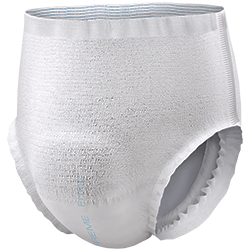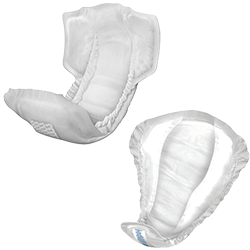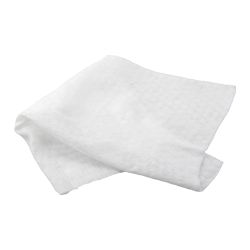Know the Symptoms of Irritable Bowel Syndrome (IBS) in Women

Irritable Bowel Syndrome, or IBS, is a relatively common intestinal disorder in the U.S. For IBS Awareness Month this April, discover the symptoms, causes and treatments of this condition and how it affects women.
This article does not replace medical advice, but instead offers information and tips on how to talk to a doctor or healthcare provider about any issues you may have. For more information about living a full life with IBS, visit the NorthShore Blog, “Four Products to Help Manage Irritable Bowel Syndrome (IBS).”
What is IBS?
IBS usually presents as abdominal pain along with a group of other intestinal symptoms. While the length of time and severity of symptoms can vary, IBS persists at least three days a month for at least three months.
The condition has also been called spastic colon and mucous colitis, among other names, and doctors sometimes diagnose IBS when finding no specific cause after excluding other conditions.
IBS affects women more than men. The International Foundation for Gastrointestinal Disorders (IFFGD) reports that 10%-15% of the worldwide population experiences IBS, and approximately two-thirds of sufferers are women.
What are the Symptoms of IBS?
There are three different types of IBS, so two people diagnosed with IBS can have very different symptoms. What is a symptom of irritable bowel syndrome consistent across all types? Stomach pain and discomfort is common in almost all types of IBS.
WebMD reports that the three types are as follows:
-
IBS with Constipation: Also known as IBS-C, this condition presents with symptoms that include bloating and cramping, lumpy or hard stool, and infrequent or delayed bowel movements. Sufferers may sometimes experience fecal impaction.
-
IBS with Diarrhea: Referred to as IBS-D, this type comes with symptoms that include stomach cramps, loose or watery stool, very frequent bowel movements and urgency to relieve bowels.
-
IBS with Constipation and Diarrhea: IBS-M (for mixed) presents with alternating symptoms of both IBS-C and IBS-D.
Individual causes of constipation and diarrhea can vary widely, and experiencing either of these occasionally isn’t usually something to worry about. But if these symptoms occur at least three days a month for three months in a row, it may be time to schedule an appointment with a doctor or healthcare provider to discuss IBS.
While some over-the-counter (OTC) medications can ease some symptoms of IBS, someone experiencing mixed IBS may want to avoid self-treating and setting up a boomerang effect—constipation treatments may cause diarrhea and vice versa. Talk to a doctor or healthcare provider before attempting self-treatment.
Are Symptoms of IBS in Women Different?
Even though it’s more common in women, the condition may also be more easily misdiagnosed in women. The symptoms of IBS in women may overlap with endometriosis.
While it is possible to have both, it can be difficult to pinpoint which condition a woman has. Healthline reports that symptoms of endometriosis include abdominal cramping and pain with bowel movements, bloating, diarrhea and nausea—similar to IBS symptoms.
In addition, the GI Society reports that women with pelvic inflammatory disease (PID) may also be misdiagnosed as having IBS. All of these conditions can negatively affect a person’s quality of life, so it’s important it is to discuss all symptoms with a doctor to find the right course of treatment.
To help inform a diagnosis of IBS, a doctor may want to explore gluten or lactose intolerances, any infectious illnesses or other bowel diseases. They may order an endoscopy or colonoscopy to look for irregularities in the lining of the esophagus, stomach or colon.
When trying to diagnose endometriosis, a doctor may order pelvic exams, MRIs or ultrasounds, or even surgical laparoscopy to confirm.
Tracking symptoms is critical when pursuing a diagnosis of IBS as well as during treatment. In a blog about the first signs of IBS, the National Association for Continence (NAFC) offers a stool diary for easy download.
With information on incontinence, urgency, stool consistency and medications, as well as any comments about diet or exercise, this diary can help a doctor gain a more complete picture of a patient’s lifestyle and symptoms.
Is There Treatment for IBS?
There are a number of IBS treatments available to help people manage symptoms and live a fuller life. Less severe symptoms can sometimes be treated with changes to diet and exercise regimens.
Each individual with IBS may find that different foods trigger symptoms. To learn what causes IBS flareups for you, continue to track food, exercise, medication and IBS symptoms even after diagnosis. This will help you learn what foods to avoid with IBS.
If a different diet and regular exercise don’t relieve all of the symptoms, a doctor may prescribe other treatments for IBS, including:
-
Therapy to manage stress, which can trigger IBS flareups
-
Laxatives or prescription medications to manage constipation for IBS-C
-
Antidepressants to lower the intensity of pain signals
-
Antidiarrheals to reduce frequency of bowel movements and firm stool for IBS-D
Untreated IBS can make people feel fatigued and depressed, impacting their overall enjoyment and quality of life. Take the time to track symptoms and discuss IBS with your doctor to start feeling better.
This content is not intended to be a substitute for professional medical advice, diagnosis or treatment. Always seek the advice of your physician or other qualified healthcare provider with any questions you may have regarding a medical condition.
To learn more about managing incontinence, check out our wide selection of articles available on the NorthShore Blog.
Thank you so much for reading our blogs!
Did you know NorthShore has helped millions of people manage incontinence with life-changing absorbent products? It's so amazing to hear their stories.
We also want you to know we have trained product advocates that provide a personal experience by working with each customer to find the best product for their situation.
Find out for yourself today!
To get in touch, simply provide your contact details below and your personal product advocate will reach out.












